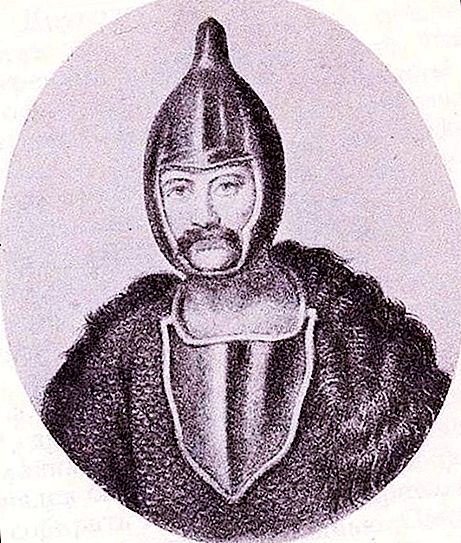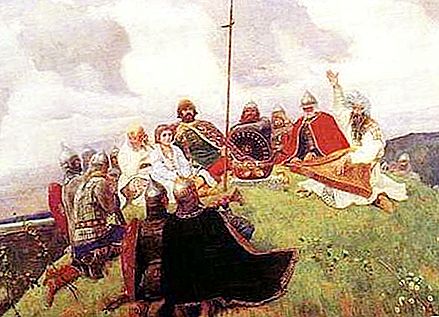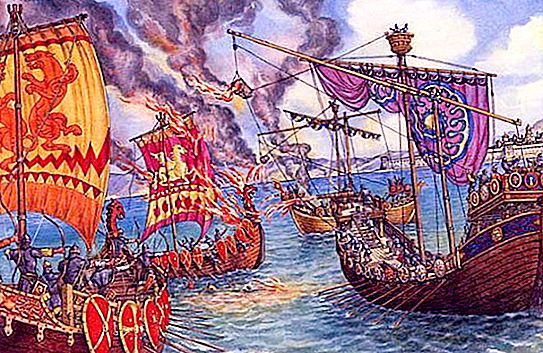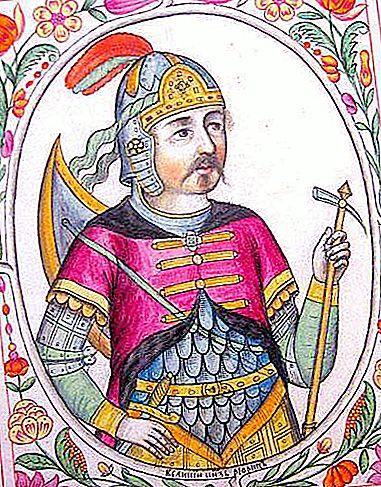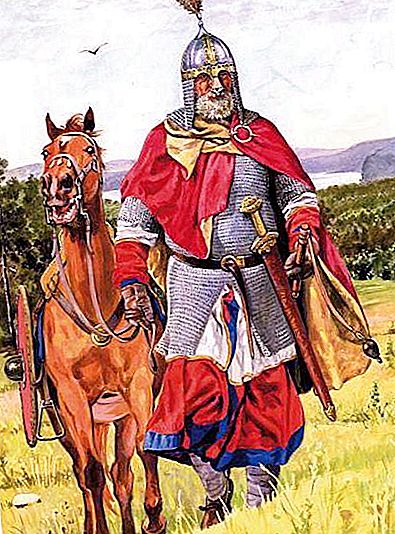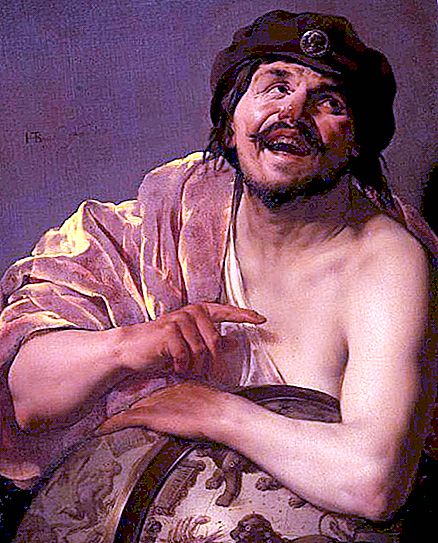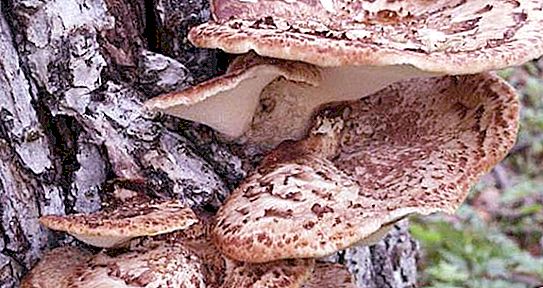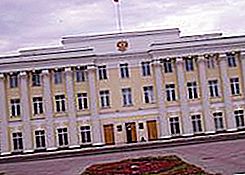Any educated person in our country knows who Igor Stary is. So called the prince of Ancient Russia, the son of Rurik and a relative of Oleg the Great, nicknamed Prophetic.
Let us consider in more detail the life and work of this ruler of the old Russian state.
Brief biographical information about birth and childhood
According to chronicles, Igor Stary lived a relatively long life for those times. He was born approximately in 878, and died (also approximately) in 945.
The years of Igor Stary’s reign cover the period from 912 to 945.
The hero of our story was the son of the first Russian prince Rurik, who, according to legend, came to Russia with his brothers and began to reign in Novgorod, and later became the sole ruler of the then Russian state. After the death of Rurik, Igor was small for years, so the functions of the prince were performed by his relative Oleg (according to one version, he was Rurik's nephew, and according to the other, his wife’s brother).
Most likely, young Igor accompanied Oleg in his military campaigns, where he acquired the skills of a military leader and politician. It is known that he did not take his father’s throne upon reaching adulthood and marriage, but after the death of the Prophetic Oleg (according to legend, he died from a bite of a poisonous snake).
Brief biographical information about the prince's family
According to the official version, the year in which Oleg died, nicknamed Prophetic, is the beginning of the reign of Igor Stary. This, as already mentioned, is 912. By that time, the young prince already had a family.
According to chronicles, when Igor was 25 years old, he was married to a girl named Olga (she was only 13). However, their son Svyatoslav was born only in 942 (it turns out that at that time Olga should have been 52 years old, which is impossible). This fact is pointed out by many historians, therefore it is believed that the age of Olga, the future Grand Duchess and the founder of Christianity in Russia, was less. There is also an assumption that Olga and Igor still had children, in particular, some historians mention two sons - Vladislav and Gleb, who probably died in their early years.
Also Byzantine sources indicate that the prince had other relatives (cousins, nephews, etc.). However, in the Russian chronicles there is no mention of these people. Most likely, they did not own any lands and powers, but entered the squad of Prince Igor. Modern historians consider this version to be the most justified, because, most likely, in Ancient Russia there was a tradition characteristic of European states, according to which only the ruler himself, his wife (s) and children, were mentioned in official documents about other relatives (and therefore, and applicants to the throne) did not say a word.
Military campaigns on Constantinople
Igor Stary glorified himself as an experienced military leader. It is known that he made more than one military campaign against Byzantium. The Orthodox peoples who inhabited the Byzantine Empire, then suffered greatly from the raids of the barbarians, whom they called dews.
Historians note the following military campaigns of Igor Stary:
1. According to legend, Igor in 941 sailed to Byzantium, accompanied by thousands of ships called "rooks". However, the Greeks used the most advanced weapons of the time - the so-called "Greek fire" (a mixture of oil and other combustible substances), which burned most of the warships. Having suffered a defeat, Igor Stary returned home to Russia in order to gather a new army for a new military campaign. And he succeeded.
2. His military assembly included representatives of all the tribes of the then Old Russian state, both Slavs and Rus, Pechenegs, Drevlyans, etc. This campaign turned out to be more successful for the prince, as a result, he concluded a peace treaty with the Byzantines providing for the payment of certain material resources. In this treaty, the text of which the Greeks retained, both Igor himself and his wife Olga and their common son Svyatoslav are mentioned.
The domestic policy of Igor Stary
The prince has become famous for centuries as a strict and demanding person. A successful conqueror, he annexed new lands to his state, and then laid tribute to the tribes he had conquered. The reign of Igor Stary was remembered by the pacification of streets and Tivertsy, Drevlyans and many other nationalities.
The strongest resistance to the prince was shown by the Drevlyans (their conquest took place at the dawn of the reign of Igor, in 912). They refused to pay tribute, but Igor and his squad ravaged the Drevlyan settlements and, in punishment, obliged local residents to pay even more than before. Reliquely reluctantly agreed, but harbored a strong grudge against the prince in their hearts.
Igor Stary’s domestic policy was also distinguished by new ways of collecting tribute, which he himself called polyud. This procedure consisted of the following: the prince annually with his squad traveled around the territories subject to him and collected a “tax” from those tribes who lived there. He took tribute in a natural way: both with grain, flour and other food products, as well as with skins of wild animals, honey of wild bees, and more. Often, the warriors of the prince behaved as impudent conquerors, which caused a lot of insults to ordinary people.
Igor’s foreign policy successes
What else did Igor Stary remember to his contemporaries? The prince’s domestic and foreign policy was aggressive, which is not surprising, especially if you remember what Igor himself was like (historians note that the prince was distinguished by a sharp and fiery temper).
His military successes also cannot be called modest. He behaved like a real barbarian, cutting open a “window” into Europe at that time — the Byzantine Empire — with fire and sword.
In addition to the two military campaigns against Byzantium already mentioned above, Igor made the same campaign to the Caspian Sea. Arab sources talk about him, but in Russian chronicles this is not even mentioned. Little is known about the results of this campaign, however, the Khazar authors believe that it had some consequences: Igor's army received rich trophies and returned home with the loot.
Also, some historians, relying on Hungarian sources, believe that Igor Stary also made an alliance with the Hungarians. The foreign policy of the prince in relation to these tribes was allied in nature, perhaps there were certain relations between the Russians and the Hungarians, allowing them to organize joint military campaigns against Byzantium.
Mysteries of personality
The reign of Igor Stary, although it lasted for many years, has not been fully studied due to the lack of information about the prince’s inner circle and his actions.
The scarcity of information about this historical person, as well as some discrepancies (for example, regarding the dates of his life, years of reign, family and death), which are found in various sources, lead to the fact that in the biography of this person there are many white spots.
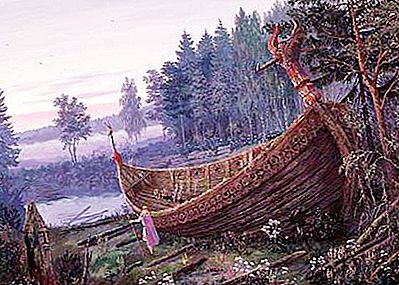
So, there are different assumptions as to who Igor’s mother was. For example, V. Tatishchev - a historian of the Petrine era - suggested that she was the Norman princess Efanda. The same Tatishchev believed that the real hero of our story was called Inger, and only later his name was transformed into Igor. The Old Prince did not receive the nickname during the reign, but much later, thanks to the Russian chronicles, calling him "ancient" or "old". And all because Igor was one of the first Rurikovich.
The main idea of Igor’s reign
Prince Igor Stary entered the Russian history very firmly. The results of the reign of this Russian ruler are associated with the strengthening of the young ancient Russian state. In fact, Igor continued the policy of his father and relative Oleg: he expanded the state, made military campaigns that brought a lot of wealth, concluded a peace treaty with the Byzantines, introduced a tax system for his subjects.
Igor was also able to leave behind a powerful heir to Svyatoslav, who continued his work. Theme by Prince Igor the Old not only strengthened his dynasty, but also strengthened his state.
Death of a prince
One of the most famous episodes of Igor's life was his tragic violent death.
The Russian chronicles describe this event in this way: Prince Igor the Old, having conquered the Drevlyans, came to them every year to collect tribute. He did the same in 945. His squad treated the Drevlyans with disdain, mending a lot of rigidity, which caused their apparent discontent. In addition, the Drevlyans had their own ruler named Mal, who perceived Igor as a victorious rival.
Having collected enough tribute from the Drevlyans, the prince went on with his retinue, but on the way back he thought about not taking as much as he wanted. It was at this moment that Igor Stary made a fatal mistake for himself. The events of the following day proved this.
The prince released his big squad and returned to the Drevlyans for a new tribute with a small army. Those, seeing that Igor had little strength, brutally dealt with him and his people. According to legend, the prince was tied to the tops of mighty trees and released them. Here such a fierce death took Igor from the supposedly conquered Drevlyans.
Olga's revenge
The Russian chronicles tell us not only about the death of Prince Igor, but also about that exquisite and terrible revenge that his wife used - widowed Princess Olga Pskovskaya, left with her three-year-old son Igor Svyatoslav without the care of her husband.
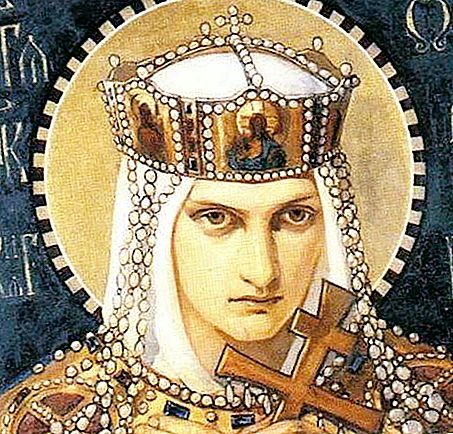
So, Olga betrayed the envoys from the Drevlyans to cruel execution (burned alive), and then made a military campaign to Iskorosten and, taking it with an attack, ruthlessly dealt with the inhabitants. According to legend, she demanded 3 doves and 3 sparrows from each yard. Having received a kind of "tribute", Olga ordered to tie tinder and sulfur to each bird, light them at night and let them go. The calculation of the cunning princess turned out to be correct: the birds returned to their nests, under the roofs of houses … Later, the son of Igor Svyatoslav planted his son Oleg to reign over the Drevlyans.
